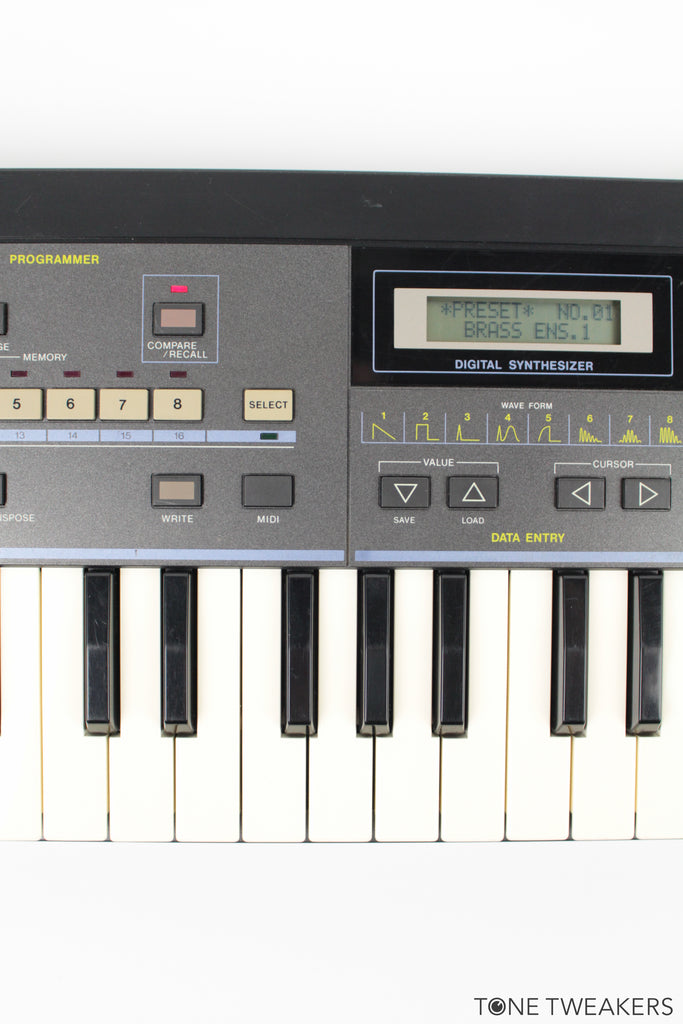

 Roland JV-80 and JV-880 (Single and Multi Modes). Oberheim Matrix 6, 6R, and 1000 (Single and (for 1000) Global Modes). Novation ReMOTE SL, SL MKII, and SL Compact Series. M-Audio Venom (Single, Multi, Arpeggiator, and Global Modes). Korg Wavestation SR (Performance, Patch, and Wave Sequence Modes). Korg MicroKorg (Single and Vocoder Modes). Korg SG Rack (Single and Multi Modes) and Korg SG Pro X. Kawai K5 and K5m (Single and Multi Modes, plus single-cycle wave uploading). Kawai K4 and Kawai K4r (Single, Multi, Drum, and Effect Modes). Kawai K1, Kawai K1m, and Kawai K1r (Single and Multi Modes). E-Mu Proteus 1, 1XR, 2, 2XR, 3, 3XR, and 1+Orchestral. E-Mu Morpheus and Ultraproteus (Single, Hyperpreset, and MidiMap modes). DSI Prophet ’08, Tetra, Mopho, Mopho Keyboard, Mopho SE, and Mopho x4 (Single and (for Tetra) Combo modes). Edisyn from developer Sean Luke is one such synthesizer editor that will give you control over a whole bunch of synths via custom made MIDI editing synthesizer templates. It makes automation a breeze, lets you save patches within DAW projects and brings you best of both hardware and software worlds. If they were record directly from the standard CZ patches/ presets, then I think it's highly unlikely that any copyright claims would hold up.Librarian synth editors are one of the most useful tools for people who prefer their sounds in hardware but sequence and edit in software. I guess if these CZ samples were recorded from custom CZ patches, then yes, they could be copyrighted. Or from another perspective, someone creating custom patches for a synth can claim copyright to those custom patches because it's their own unique work and not available with the the standard instrument's presets. Kind of similar to how Eddie Van Halen can't claim copyright to the Oberheim "Jump" patch, but he CAN claim copyright for the chord/ melody progression he created with it. However, if the person sampling the sound also modifies the samples so that they are different, but still recognisable as originating from the original presets, then they might be able to claim copyright. If the samples were taken from presets in a commercially available instrument, the person who sampled them can't claim outright copyright because anyone with access to the commercially available instrument can also use those sounds.
Roland JV-80 and JV-880 (Single and Multi Modes). Oberheim Matrix 6, 6R, and 1000 (Single and (for 1000) Global Modes). Novation ReMOTE SL, SL MKII, and SL Compact Series. M-Audio Venom (Single, Multi, Arpeggiator, and Global Modes). Korg Wavestation SR (Performance, Patch, and Wave Sequence Modes). Korg MicroKorg (Single and Vocoder Modes). Korg SG Rack (Single and Multi Modes) and Korg SG Pro X. Kawai K5 and K5m (Single and Multi Modes, plus single-cycle wave uploading). Kawai K4 and Kawai K4r (Single, Multi, Drum, and Effect Modes). Kawai K1, Kawai K1m, and Kawai K1r (Single and Multi Modes). E-Mu Proteus 1, 1XR, 2, 2XR, 3, 3XR, and 1+Orchestral. E-Mu Morpheus and Ultraproteus (Single, Hyperpreset, and MidiMap modes). DSI Prophet ’08, Tetra, Mopho, Mopho Keyboard, Mopho SE, and Mopho x4 (Single and (for Tetra) Combo modes). Edisyn from developer Sean Luke is one such synthesizer editor that will give you control over a whole bunch of synths via custom made MIDI editing synthesizer templates. It makes automation a breeze, lets you save patches within DAW projects and brings you best of both hardware and software worlds. If they were record directly from the standard CZ patches/ presets, then I think it's highly unlikely that any copyright claims would hold up.Librarian synth editors are one of the most useful tools for people who prefer their sounds in hardware but sequence and edit in software. I guess if these CZ samples were recorded from custom CZ patches, then yes, they could be copyrighted. Or from another perspective, someone creating custom patches for a synth can claim copyright to those custom patches because it's their own unique work and not available with the the standard instrument's presets. Kind of similar to how Eddie Van Halen can't claim copyright to the Oberheim "Jump" patch, but he CAN claim copyright for the chord/ melody progression he created with it. However, if the person sampling the sound also modifies the samples so that they are different, but still recognisable as originating from the original presets, then they might be able to claim copyright. If the samples were taken from presets in a commercially available instrument, the person who sampled them can't claim outright copyright because anyone with access to the commercially available instrument can also use those sounds. 
It's kind of a dodgy ground when it comes to samples.










